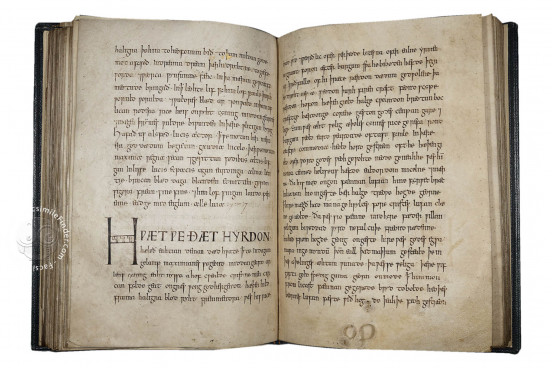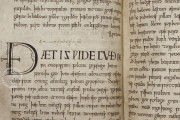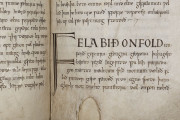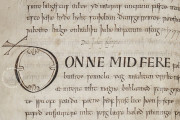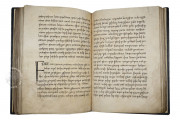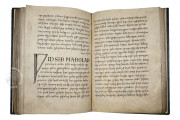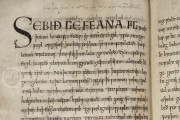The largest and probably the earliest surviving manuscript of Old English poetry, the Exeter Book preserves some of the oldest poetic literature written in the English language. Written around 965-975, the manuscript is a collection of more than thirty poems and almost 100 riddles in the West Saxon dialect of Old English, most probably composed long before the manuscript was copied. The texts, all preserved uniquely in this codex, include elegies, Christian biblical and hagiographic poetry, allegory, epic travel literature, wisdom lyrics, verse maxims, and riddles (some bawdy). Two poems are signed by Cynewulf.
The Exeter Book is one of four manuscripts that together preserve almost all of the Old English poetic corpus. The others are the Vercelli Book, the Nowell Codex, and the Junius Manuscript (Oxford, Bodleian Library, MS Junius 11).
Famous Works
Widely admired poetic works in the manuscript include the Seafarer, the Wanderer, the two by Cynewulf—Juliana and Christ II (also known as Ascension)—and two works that feature a woman's voice: Wulf and Eadwacer and the Wife's Lament.
English Literature from the Transcendent to the Ribald
The Exeter Book contains thirty-four individual poems and ninety-five riddles. While most of the poetic works focus on matters of faith, loss, and history, the subject matter of the riddles can be as lofty as philosophy or suggest a risqué double-meaning for everyday objects such as keys and onions.
Exquisite Writing
The large manuscript was written by a single scribe in long lines (a single column) in English Vernacular Minuscule. Some first lines are in angular majuscules, and some of the initial letters feature scalloped decoration.
Added Drawings
A series of drawings was made in the manuscript's margins in drypoint, a stylus that leaves only an indentation but no trace metal behind. Barely visible, even under raking light, they include foliate designs, letters, human hands, and three human figures (one winged, one robed, and one on horseback).
Substitute Text
The first several leaves of the original Exeter Book have been lost. What now opens the manuscript are seven leaves with a list of manuscripts donated by Leofric (d. 1072), Bishop of Exeter, to the cathedral in the see he established at Exeter and other documents of the time. These leaves were probably removed in 1566 from Cambridge, Cambridge University Library, MS Ii.2.11.
From Perceived Treasure to Disinterest to UNESCO Status
The manuscript was among those bequeathed by Leofric to Exeter Cathedral. In the following centuries, the manuscript suffered stains, burns, and cuts, apparently having been used as a glue stand, a cutting board, and a press for gold and silver leaf. The current binding, dating from 1930, replaced one of around 1700.
The manuscript was added in 2016 to the UNESCO Memory of the World Register. In 2019, the city of Exeter was designated a UNESCO City of Literature, thanks in part to the manuscript's presence there.
We have 1 facsimile edition of the manuscript "Exeter Book": Exeter Book of Old English Poetry facsimile edition, published by Lund Humphries, 1933
Request Info / Price
